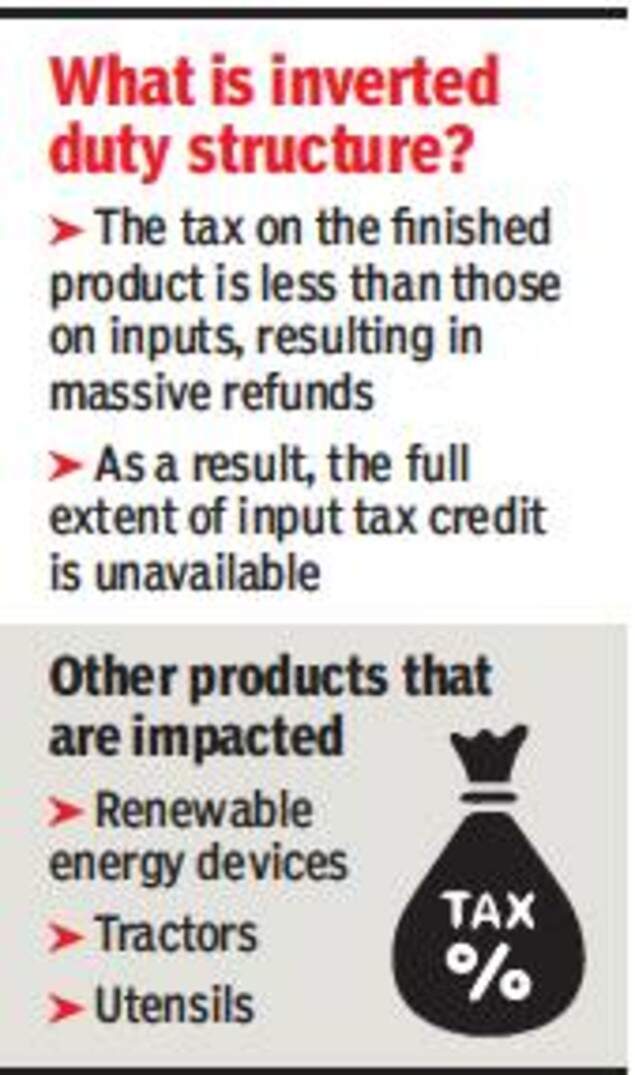
NEW DELHI: Ahead of the Goods and Services Tax (GST) Council meeting on Saturday, the government is pushing for a review of the levy on mobile phones, footwear, fertiliser and man-made fibres to correct a major discrepancy that has crept in where the duty on the finished product is lower than those on inputs.
The “inverted duty structure” is resulting in massive refund claims on tax paid on inputs, although the government does not allow credit for levies on input services and capital goods, making the tax regime inefficient. Estimated annual refund on account of inverted rate structure was estimated at around Rs 20,000 crore.
At least four items — mobile phones, footwear, manmade fabrics and fertiliser — have been identified for a possible change in levies, which may rise in a phased manner. The move is part of a review of the wider duty structure where several items such as utensils and renewable energy equipment were also flagged, although their volume is much lower.

The proposals have been discussed by a committee of officers on augmentation of revenue, which was also on the agenda for the last GST Council meeting. Sources said that there is little justification in retaining a 12% levy on mobile phones when many electronic items such as TV, water heaters and mixers are taxed at a higher rate. Besides, before the launch of GST, the levy was higher.
The issue is a little complex in case of fertilisers as the government will have to increase the subsidy to correct the inverted rate structure to ensure that farmers are not impacted. But officials reckon that a corrected GST rate structure would go a long way in refining the indirect tax system. Against taxes of around 9.75% before GST, the government had put fertilisers in the 12% bracket. But states got the GST Council to reduce the levy to 5%, creating a situation where Rs 6,000 crore have been claimed as input tax credit refund on fertilisers.
For man-made fibres, the textiles ministry has made a strong pitch for correcting the duty structure, arguing that differential rates and slow-refunds of accumulated input tax credit have affected the competitiveness of the industry and hit investment. The ministry has demanded that man-made fibres and yarns need to be brought under a uniform tax slab as it will benefit the spinning and power loom sectors.
The “inverted duty structure” is resulting in massive refund claims on tax paid on inputs, although the government does not allow credit for levies on input services and capital goods, making the tax regime inefficient. Estimated annual refund on account of inverted rate structure was estimated at around Rs 20,000 crore.
At least four items — mobile phones, footwear, manmade fabrics and fertiliser — have been identified for a possible change in levies, which may rise in a phased manner. The move is part of a review of the wider duty structure where several items such as utensils and renewable energy equipment were also flagged, although their volume is much lower.

The proposals have been discussed by a committee of officers on augmentation of revenue, which was also on the agenda for the last GST Council meeting. Sources said that there is little justification in retaining a 12% levy on mobile phones when many electronic items such as TV, water heaters and mixers are taxed at a higher rate. Besides, before the launch of GST, the levy was higher.
The issue is a little complex in case of fertilisers as the government will have to increase the subsidy to correct the inverted rate structure to ensure that farmers are not impacted. But officials reckon that a corrected GST rate structure would go a long way in refining the indirect tax system. Against taxes of around 9.75% before GST, the government had put fertilisers in the 12% bracket. But states got the GST Council to reduce the levy to 5%, creating a situation where Rs 6,000 crore have been claimed as input tax credit refund on fertilisers.
For man-made fibres, the textiles ministry has made a strong pitch for correcting the duty structure, arguing that differential rates and slow-refunds of accumulated input tax credit have affected the competitiveness of the industry and hit investment. The ministry has demanded that man-made fibres and yarns need to be brought under a uniform tax slab as it will benefit the spinning and power loom sectors.
Download The Times of India News App for Latest Business News.
more from times of india business
Business News
LATEST VIDEOS
More from TOI
Navbharat Times
Featured Today in Travel
Quick Links
ELSS Mutual Funds BenefitsIncome Tax Refund statusWhat is AssochamITR Filing Last DateHome Loan EMI TipsHome Loan Repayment TipsPradhan Mantri Awas YojanaTop UP Loan FeaturesIncrease Home Loan EligibilityHome Loan on PFTax Saving Fixed DepositLink Aadhaar with ITRAtal Pension YojanaNita AmbaniIndian EconomyRBIAadhaar CardSBIReliance CommunicationsMukesh AmbaniIndian Bank Ifsc codeIDBI Ifsc codeIndusind ifsc codeYes Bank Ifsc CodeVijay Bank Ifsc codeSyndicate bank Ifsc CodePNB Ifsc codeOBC Ifsc codeKarur vysya bank ifscIOB Ifsc codeICICI Ifsc codeHDFC Bank ifsc codeCanara Bank Ifsc codeBank of baroda ifscBank of America IFSC CodeBOM IFSC CodeAndhra Bank IFSC CodeAxis Bank Ifsc CodeSBI IFSC CodeGST
Get the app







